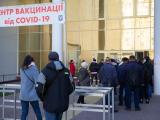The latest data and projections from the United Kingdom, closely watched as Europe's biggest Omicron hot spot, cast doubt on whether infections are less severe than Delta variant infections, with South African experts reporting that the milder illness they see might not be due to the virus itself but from preexisting immunity.
Though experts say it typically takes a while to assess severity, the uncertainties have experts on edge. The highly transmissible new variant is taking off in many locations amid holiday travel and gatherings. UK cases today soared to another daily record for the third day in a row, as officials added 93,045 new cases.
Also, the country added 3,201 more cases to its Omicron total, putting the total at 14,909, with about four out of five of the cases in London.
A cloudy crystal ball for severity
It its latest assessment, researchers from Imperial College London who examined data on people reporting symptoms and the proportion of cases needing hospitalization found no evidence that Omicron infections are less severe than Delta. They added, however, that hospitalization data are currently very limited.
The group also found that the risk of reinfection with Omicron is 5.4 times greater than with Delta, putting protection from earlier infection as low as 19%. They also estimate that Omicron cases doubled every 2 day up to Dec 11 and that Omicron's reproduction number was above 3 during the same period.
The experts found a different pattern for Omicron compared with Delta, with young adults, London residents, and those with African ethnicity more affected by Omicron.
They estimated vaccine effectiveness after two doses at 0% to 20%, and effectiveness after a booster dose at 55% to 80%.
In a statement from the college, epidemiologist Neil Ferguson, OBE, said the study adds more evidence of substantial immune evasion from both infection and vaccination. "This level of immune evasion means that Omicron poses a major, imminent threat to public health," he said.
The UK's Health Security Agency today in its latest weekly risk assessment also reflected the uncertainty about Omicron severity. "There are insufficient data to fully assess severity, which is expected in the early period of emergence of a new variant," it said. "However, on the data available in the UK, there is no signal that supports a difference in the intrinsic virulence of the Omicron virus compared to Delta."
Meanwhile, at a briefing today in South Africa, Health Minister Joe Phaahla said the early anecdotal reports of milder Omicron illnesses might not reflect a less virulent virus but may instead be due to natural immunity from earlier infection or vaccination, according to Reuters.
Michelle Groome, PhD, with the National Institute for Infectious Diseases, said hospitalizations and deaths are rising, but deaths are at a much lower level than in earlier waves.
More global headlines
- The World Health Organization (WHO) today announced that it has listed a ninth COVID-19 vaccine for emergency use, a subunit two-dose vaccine developed by Novavax and the Coalition for Epidemic Preparedness and Innovations. The vaccine is produce by India's Serum Institute, and the WHO's listing paves the way for the vaccine to be used in lower-income countries where more supplies are urgently needed. (See yesterday's CIDRAP News story.)
- Australia today reported a new daily record high for COVID-19 cases, fueled by a super spreader event in Sydney and clusters in bars and nightclubs, according to Reuters. Both the Delta and Omicron variants are circulating.
- The ZOE COVID survey that focused on positive cases from London suggests that Omicron symptoms are similar to cold symptoms, with the most frequent reports being runny nose, headache, fatigue (mild or severe), sneezing, and sore throat.
- The overall global COVID-19 total today rose to 273,330,045 cases, plus 5,341,760 deaths, according to the Johns Hopkins online dashboard.






















